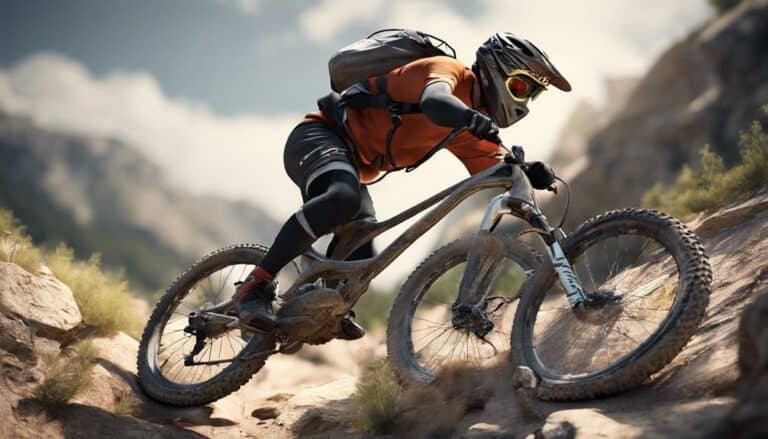When you hit the trails, selecting the right gear is key. Improper gear choices can lead to a domino effect of issues that compromise your biking experience.
From mechanical malfunctions to increased risk of accidents, the repercussions of not getting your gears right can be far-reaching.
Stay tuned to uncover the intricacies and potential pitfalls of misjudging your gear selection on those off-road adventures.
Key Takeaways
- Improper gear selection hinders traction, efficiency, and safety on off-road trails.
- Engine strain, wear, and reduced performance result from incorrect gear choices.
- Accelerated wear on bike components and drivetrain occurs with improper gear selection.
- Handling challenges and safety risks increase with incorrect gear selection, impacting overall biking experience.
Gear Selection Impact on Off-Road Performance
Improper gear selection greatly impacts your off-road biking performance, potentially leading to loss of momentum, control issues on challenging terrain, and increased risk of mechanical failures. When selecting gears for off-road biking, it's essential to take into account the terrain you'll encounter.
Opting for too high a gear can cause you to lose momentum, struggle to navigate obstacles like rocks and roots, and even risk stalling. On the other hand, choosing a gear that's too low might result in spinning out on loose surfaces or lacking the power needed for uphill climbs.
Proper gear selection plays a crucial role in maintaining traction, efficiency, and overall performance during off-road biking. When your gears aren't appropriately matched to the terrain, you not only risk losing control and momentum but also increase the likelihood of chain drops, derailments, and damage to drivetrain components.
Engine Strain Due to Improper Gearing
Incorrect gear selection not only impacts your off-road biking performance but also places undue strain on the engine, potentially leading to increased workload and overheating concerns. When the bike is consistently ridden in the wrong gear, it can result in detrimental effects on the engine, jeopardizing its efficiency and longevity. Here are some key points to take into account:
- Increased Wear and Tear: Running the engine in improper gears can accelerate wear and tear on vital components, necessitating frequent maintenance.
- Reduced Power Output: Incorrectly shifting can diminish the bike's power output, affecting its overall performance and responsiveness.
- Elevated Fuel Consumption: Engine strain from improper gearing can lead to decreased fuel efficiency, translating to higher operating costs.
- Risk of Overheating: Continuous strain on the engine due to incorrect gear selection raises the risk of overheating, potentially causing severe damage.
- Long-Term Reliability Concerns: The cumulative impact of engine strain can compromise the overall reliability and longevity of your off-road bike.
Be mindful of your gear choices to uphold your bike's health and performance on off-road adventures.
Safety Risks of Incorrect Gear Choice
When selecting gears for off-road biking, ensuring the right gear choice is important to maintaining control and safety on challenging terrains. Safety risks associated with improper gear selection during off-road biking can be substantial.
One of the primary dangers is the potential loss of control that can occur when using the wrong gear. This loss of control can lead to accidents, especially when tackling difficult obstacles or steep inclines. Improper gear selection can result in reduced traction, making it harder to maneuver the bike effectively.
Additionally, using the incorrect gear may cause the bike to stall or lose momentum at critical moments, increasing the likelihood of accidents and injuries. In addition, inadequate gear selection can put excessive strain on the drivetrain and engine components, potentially leading to mechanical failures.
Ensuring proper gear selection is essential to mitigate these safety risks and enjoy a safe off-road biking experience.
Wear and Tear on Bike Components
The strain caused by improper gear selection during off-road biking can greatly accelerate the wear and tear on essential bike components such as the chain, cassette, and derailleur.
When gear selection isn't essential, the following consequences may arise:
- Premature Wear: Incorrect gear usage can lead to premature wear on the chain, cassette, and derailleur, shortening their lifespan.
- Increased Damage Risk: Excessive stress on components from improper gear selection increases the risk of damage, necessitating costly repairs.
- Drivetrain Deterioration: Constantly using the wrong gear can wear out the drivetrain faster, requiring frequent replacements.
- Transmission System Strain: Inefficient gear selection strains the bike's transmission system, potentially leading to costly maintenance.
- Performance Impact: Poor gear choices not only accelerate wear on components but also hinder the bike's overall performance, impacting your off-road biking experience.
Proper gear selection is vital to ensuring the longevity and efficiency of your bike components, avoiding unnecessary expenses and maintaining a smooth riding experience.
Handling Challenges From Wrong Gear Selection
Improper gear selection off-road presents challenges that can majorly impact your momentum and control, especially when maneuvering challenging terrain. When your gear is too high, your pedal stroke becomes less efficient, leading to a loss of momentum and potentially stalling on steep climbs.
Conversely, selecting a gear too low can result in spinning out, causing a loss of power when guiding obstacles or rough terrain. These incorrect gear choices not only hinder your performance but can also disrupt your muscle memory, affecting your ability to smoothly shift gears and maintain a consistent pace.
Moreover, the risk of chain derailment or damage increases with improper gear selection, necessitating immediate attention to avoid more significant problems. To handle these challenges effectively, focus on selecting the appropriate gear ratio for the specific terrain you're riding on, ensuring a balance between traction, power, and efficiency.
Conclusion
To sum up, remember the repercussions of wrong gear selection while off-road biking. Engine strain, safety risks, wear on components, and handling challenges can all result from improper gear choices.
To prevent these pitfalls, practice proper gear shifting techniques. Ride responsibly, ensuring a smooth and safe biking experience. Avoid alliteration pitfalls by practicing precision in gear selection.

